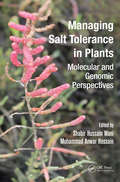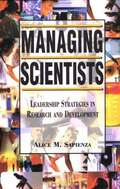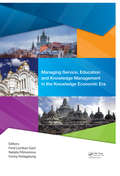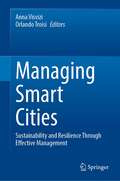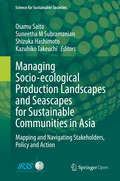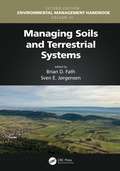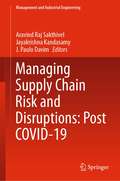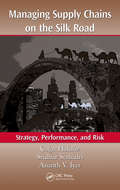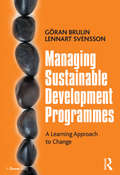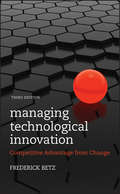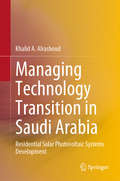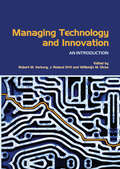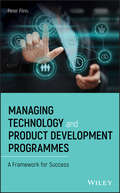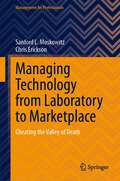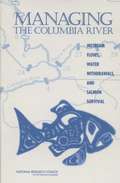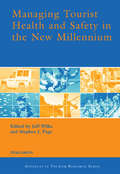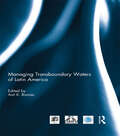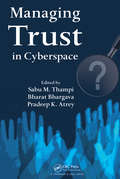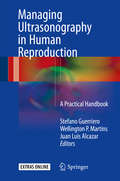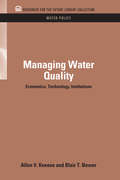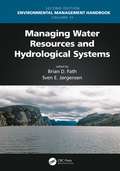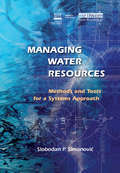- Table View
- List View
Managing Salt Tolerance in Plants: Molecular and Genomic Perspectives
by Mohammad Anwar Hossain Shabir Hussain WaniSalinity stress currently impacts more than 80 million hectares of land worldwide and more arable land is likely to be impacted in the future due to global climate changes. Managing Salt Tolerance in Plants: Molecular and Genomic Perspectives presents detailed molecular and genomic approaches for the development of crop plants tolerant to salinity
Managing Scientists: Leadership Strategies in Research and Development
by Alice M. SapienzaIn today's climate of enormous scientific and technological competition, it is more crucial than ever that scientists' involvement in research and development be managed well.
Managing Service, Education and Knowledge Management in the Knowledge Economic Era: Proceedings of the Annual International Conference on Management and Technology in Knowledge, Service, Tourism & Hospitality 2016 (SERVE 2016), 8-9 October 2016 & 20-21 October 2016, Jakarta, Indonesia & Vladimir State University, Vladimir, Russia
by Ford Lumban Gaol, Natalia Filimonova and Fonny HutagalungManaging Service, Education and Knowledge Management in the Knowledge Economic Era contains papers that were originally presented at the 2016 International Congress on Management and Technology in Knowledge, Service, Tourism & Hospitality (SERVE 2016), held 8-9 October 2016 & 20-21 October 2016, in Jakarta, Indonesia & at the Vladimir State University, Vladimir, Russia. The contributions deal with various interdisciplinary research topics, particularly in the fields of social sciences, education, economics and arts. The papers focus especially on such topics as language, cultural studies, economics, behavior studies, political sciences, media and communication, psychology and human development. These proceedings should be of interest to academics and professionals in the wider field of social sciences, including disciplines such as education, psychology, tourism and knowledge management.
Managing Smart Cities: Sustainability and Resilience Through Effective Management
by Anna Visvizi Orlando TroisiThis book adopts the managerial perspective to the study of smart cities. As such, this book is a necessary addition to the existing body of literature on smart cities. The chapters included in this book prove the case that transformation of cities to smart cities is a function of effective and efficient management practices implemented at diverse levels of smart cities. While advances in information and communication technology (ICT) are crucial, it is the ability to apply ICT consciously and efficiently that drives the transformation of cities to smart cities in a manner conducive to cities’ sustainability and resilience.The book covers three sets of interconnected topics:Management and decision-making for urban design and infrastructure developmentManagement and decision-making in context of smart cities developmentWays of promoting and ensuring participation, representation and co-creation in smart cities These three groups of topics offer a great opportunity to acquire a clear, direct, and practice-driven knowledge and understanding of how effective management allows ICT-enhanced tools and applications to change smart cities, possibly making them smarter.
Managing Socio-ecological Production Landscapes and Seascapes for Sustainable Communities in Asia: Mapping and Navigating Stakeholders, Policy and Action (Science for Sustainable Societies)
by Osamu Saito Kazuhiko Takeuchi Suneetha M Subramanian Shizuka HashimotoThis open access book presents up-to-date analyses of community-based approaches to sustainable resource management of SEPLS (socio-ecological production landscapes and seascapes) in areas where a harmonious relationship between the natural environment and the people who inhabit it is essential to ensure community and environmental well-being as well as to build resilience in the ecosystems that support this well-being. Understanding SEPLS and the forces of change that can weaken their resilience requires the integration of knowledge across a wide range of academic disciplines as well as from indigenous knowledge and experience. Moreover, given the wide variation in the socio-ecological makeup of SEPLS around the globe, as well as in their political and economic contexts, individual communities will be at the forefront of developing the measures appropriate for their unique circumstances. This in turn requires robust communication systems and broad participatory approaches.Sustainability science (SuS) research is highly integrated, participatory and solutions driven, and as such is well suited to the study of SEPLS. Through case studies, literature reviews and SuS analyses, the book explores various approaches to stakeholder participation, policy development and appropriate action for the future of SEPLS. It provides communities, researchers and decision-makers at various levels with new tools and strategies for exploring scenarios and creating future visions for sustainable societies.
Managing Soils and Terrestrial Systems
by Brian D. Fath Sven E. JørgensenBringing together a wealth of knowledge, Environmental Management Handbook, Second Edition, gives a comprehensive overview of environmental problems, their sources, their assessment, and their solutions. Through in-depth entries and a topical table of contents, readers will quickly find answers to questions about environmental problems and their corresponding management issues. This six-volume set is a reimagining of the award-winning Encyclopedia of Environmental Management, published in 2013, and features insights from more than 400 contributors, all experts in their field. The experience, evidence, methods, and models used in studying environmental management are presented here in six stand-alone volumes, arranged along the major environmental systems. Features The first handbook that demonstrates the key processes and provisions for enhancing environmental management Addresses new and cutting-edge topics on ecosystem services, resilience, sustainability, food–energy–water nexus, socio-ecological systems, and more Provides an excellent basic knowledge on environmental systems, explains how these systems function, and offers strategies on how to best manage them Includes the most important problems and solutions facing environmental management today In this third volume, Managing Soils and Terrestrial Systems, the general concepts and processes of the geosphere with its related soil and terrestrial systems are introduced. It explains how these systems function and provides strategies on how to best manage them. It serves as an excellent resource for finding basic knowledge on the geosphere systems and includes important problems and solutions that environmental managers face today. This book practically demonstrates the key processes, methods, and models used in studying environmental management.
Managing Supply Chain Risk and Disruptions: Post COVID-19 (Management and Industrial Engineering)
by J. Paulo Davim Aravind Raj Sakthivel Jayakrishna KandasamyThis book summarizes the effect of COVID-19 on the global supply chain. Eminent researchers, practitioners, and professors discuss the challenges faced by supply chain providers and supply chain strategies related to various global, retail, fast moving consumer goods, humanitarian, pharmaceutical, and agricultural supply chains. This book also suggests the resilient approach adopted by supply chain organizations for quick recovery and re-establishing their networks. This book helps the readers explore the pandemic's impact on the supply chain and rebuilding the same using suitable approaches.
Managing Supply Chains on the Silk Road: Strategy, Performance, and Risk
by Sridhar Seshadri Çağri Haksöz Ananth V. IyerHistorically important trade routes for goods of all kinds for more than 3000 years, the Silk Road has once again come to prominence. Managing Supply Chains on the Silk Road: Strategy, Performance, and Risk present emerging supply chain practices from the Silk Road regions that include China, Hong Kong, India, Pakistan, Iran, Central Asia, Lebanon,
Managing Sustainable Development Programmes: A Learning Approach to Change
by Gran Brulin Lennart SvenssonProject work, driven by competent project leaders drives positive outcomes. Unfortunately these optimistic initial results are often short-sighted with few evaluations of their long-term impact. The research contained in Managing Sustainable Development Programmes reveals an extraordinary level of failure in the durability of large change programmes and projects in both the private and public sectors. In this book the authors question whether sustainable development be achieved within the framework of large publicly financed programmes. This strong critique of traditional programme implementation overturns much of our current thinking about project delivery and governance. The authors focus instead on sustainable change and development. They show how active ownership and collaboration between different actors and the dynamics of developmental learning can be used to create programmes and projects that contribute to innovation, employment and growth in a way that favours companies, employees, customers and society in a broader sense. The message at its heart is 'don't blame the project leader' but rather look for dynamic possession of projects, joint knowledge management and sharing with external stakeholders that will secure long-term effects.
Managing Technological Innovation
by Frederick BetzWritten by the author who helped crystalize the field of technology management and the management of innovation with the first two editions of Managing Technological Innovation, this Third Edition brings the subject in line with current business strategy. It also presents information in a newer organized format that aligns more closely with how the topics are presented and discussed in the classroom. Also included is a wider discussion of how science and technology interact with the global economy.
Managing Technology Transition in Saudi Arabia: Residential Solar Photovoltaic Systems Development
by Khalid A. AlrashoudThis book presents a comprehensive overview of the adoption of small-scale residential solar photovoltaic systems (RSPSs) in Saudi Arabia. Focusing on the current technological development of RSPSs, it discusses elements of socio-technical governance theories and energy policy analysis. It also identifies the critical factors that affect Saudi residents’ decisions to adopt this new technology and analyzes broader energy systems on a state level by investigating factors that shape RSPSs integration policies. This multi-faceted, interdisciplinary book paves the way for an integrated transition management policy design model to stimulate RSPSs adoption rates. Given its scope, it is a valuable resource for readers seeking an in-depth and up-to-date integrated overview of the ever-expanding theoretical and quantitative fields of socio-technical transitions and the transition to sustainability.
Managing Technology and Innovation: An Introduction
by Robert Verburg J. Roland Ortt Willemijn M. DickeModern technology and innovation are vital to the success of all companies, be they hi-tech firms or companies seemingly unaffected by technology and innovation; whether established firms or business start-ups. This book focuses on understanding technology as a corporate resource, covering product development, design of systems and the managerial aspects of new and high technology. Topics investigated include: the internal organization of high technology firms the management of technology in society managing innovation dilemmas and strategies. The wide-ranging experience of the teachers and experts contributing to this book has resulted in an integrated, multi-disciplinary, textbook that provides an introductory overview to managing technology and innovation in the twenty-first century. This text is essential reading for students of business and engineering concerned with technology and innovation management.
Managing Technology and Product Development Programmes: A Framework for Success
by Peter FlinnAn authoritative guide to new product development for early career engineers and engineering students Managing Technology and Product Development Programmes provides a clear framework and essential guide for understanding how research ideas and new technologies are developed into reliable products which can sold successfully in the private or business marketplace. Drawing on the author’s practical experience in a variety of engineering industries, this important book fills a gap in the product development literature. It links back into the engineering processes that drives the actual creation of products and represents the practical realisation of innovation. Comprehensive in scope, the book reviews all elements of new product development. The topics discussed range from the economics of new product development, the quality processes, prototype development, manufacturing processes, determining customer needs, value proposition and testing. Whilst the book is designed with an emphasis on engineered products, the principles can be applied to other fields as well. This important resource: Takes a holistic approach to new product development Links technology and product development to business needs Structures technology and product development from the basic idea to the completed off-the-shelf product Explores the broad range of skills and the technical expertise needed when developing new products Details the various levels of new technologies and products and how to track where they are in the development cycle Written for engineers and students in engineering, as well as a more experienced audience, and for those funding technology development, Managing Technology and Product Development Programmes offers a thorough understanding of the skills and information engineers need in order to successfully convert ideas and technologies into products that are fit for the marketplace.
Managing Technology from Laboratory to Marketplace: Cheating the Valley of Death (Management for Professionals)
by Sanford L. Moskowitz Chris EricksonManaging Technology from Laboratory to Marketplace outlines the process of getting innovative research out of the laboratory and into the market, a path which is often fraught with challenges. Many research projects meet their end as they attempt to cross this so-called “valley of death"--the period between the research phase of a project and the point when the new product or process emerging from that research becomes commercialized and enters the market. Firstly, this book aims to better understand how and why projects succeed in entering the market while others falter. Second, it uses these insights to guide researchers to optimize their chances of successfully making that transition, and finding their place in the market. The book primarily uses case studies from the field of advanced materials, but can be used by any researcher making the transition from laboratory to marketplace.
Managing Temperature Effects in Nanoscale Adaptive Systems
by Paul Ampadu David WolpertThis book discusses new techniques for detecting, controlling, and exploiting the impacts of temperature variations on nanoscale circuits and systems. A new sensor system is described that can determine the temperature dependence as well as the operating temperature to improve system reliability. A new method is presented to control a circuit's temperature dependence by individually tuning pull-up and pull-down networks to their temperature-insensitive operating points. This method extends the range of supply voltages that can be made temperature-insensitive, achieving insensitivity at nominal voltage for the first time.
Managing The Columbia River: Instream Flows, Water Withdrawals, And Salmon Survival
by Committee on Water Resources Management Instream Flows Salmon Survival in the Columbia River BasinFlows of the Columbia River, although modified substantially during the twentieth century, still vary considerably between seasons and between years. Lowest flows tend to occur during summer months when demand for irrigation water is at its highest and when water temperatures are greatest. These periods of low flows, high demand, and high temperature are critical periods for juvenile salmon migrating downstream through the Columbia River hydropower system. Although impacts on salmon of any individual water withdrawal may be small, the cumulative effects of numerous withdrawals will affect Columbia River flows and would pose increased risks to salmon survival. The body of scientific knowledge explaining salmon migratory behavior and physiology is substantial, but imperfect, and decision makers should acknowledge this and be willing to take action in the face of uncertainties. In order to provide a more comprehensive water permitting process, the State of Washington, Canada, other basin states, and tribal groups should establish a basin-wide forum to consider future water withdrawal application permits. If the State of Washington issues additional permits for water withdrawals from the Columbia River, those permits should contain provisions that allow withdrawals to be curtailed during critical high-demand periods.
Managing Tourist Health and Safety in the New Millennium (Advances In Tourism Research Ser.)
by Stephen J. Page Jeff WilksManaging Tourist Health is a seminal study which combines a range of state of the art reviews of the issues facing tourism managers and professionals in the fast growing area of tourist health and safety. An international range of contributors, each a specialist in their chosen field, have written papers for this book to explain many of the complex issues affecting tourists, the tourism industry and governments in ensuring tourism is viewed as a safe and enjoyable experience for all.The contributors have a wealth of interdisciplinary experience ranging from medicine, law, tourism research, safety science, ergonomics, management, consultancy among other cognate areas of study. Future research directions are examined in many of the chapters together with current state of the art knowledge in relation to key studies. The editors have worked in this area of research since the late 1980s and have accumulated a wide range of academic, professional and consultancy experience for governments and the private sector. The book extends this understanding through a multi-disciplinary perspective combining some of the leading researchers who have published in this area since the emergence of tourist health as a legitimate area of study in the 1970s.
Managing Transboundary Waters of Latin America (Routledge Special Issues on Water Policy and Governance)
by Asit K. BiswasDefinitive analyses of transboundary water management in Latin America are conspicuous by their absence. The situation is a little better for rivers compared to groundwater resources. Transboundary water management in Latin America has been evolving in a somewhat different manner compared to other continents.The book includes eight authoritative case studies of Latin American transboundary rivers and aquifers, as well as a thinkpiece on the complexities of managing aquifers based on global experiences. The case studies are of different scales, ranging from the mighty Amazon to small Silala. The overall focus of the book is on ways in which such difficult and complex rivers and aquifers that are shared by two or more countries can be managed efficiently and equitably, and on the lessons, both positive and negative, that other regions can learn from the Latin American experience.This book was published as a special issue of the International Journal of Water Resources Development.
Managing Trust in Cyberspace
by Pradeep K. Atrey Sabu M. Thampi Bharat BhargavaIn distributed, open systems like cyberspace, where the behavior of autonomous agents is uncertain and can affect other agents' welfare, trust management is used to allow agents to determine what to expect about the behavior of other agents. The role of trust management is to maximize trust between the parties and thereby provide a basis for cooper
Managing Turfgrass Pests
by Thomas L. Watschke Peter H. Dernoeden David J. ShetlarWritten by three of the top professionals in the turfgrass field, Managing Turfgrass Pests, Second Edition brings together hundreds of solutions and best practices to help you manage turfgrass weeds, diseases, and insects more effectively. Since the publication of the bestselling first edition, advances in pest-resistant turfgrass cultivars and pes
Managing Ultrasonography in Human Reproduction
by Stefano Guerriero Wellington P. Martins Juan Luis AlcazarThis book is a practical guide to the performance of ultrasonography in women of reproductive age for the diagnosis and treatment of infertility. The coverage includes the use of ultrasonography for evaluation of the various disorders associated with infertility, such as endometriosis, anovulatory disorders, tubal disease, and adenomyosis; its role in assisted reproductive techniques; and its application to assess the viability and early complications of pregnancy. The more recent advances in the field are all addressed, including assessment of ovarian reserve, new classifications of uterine malformations using three-dimensional ultrasonography, and novel ultrasonographic modalities for the evaluation of tubal patency. Within each chapter, the focus is especially on the performance of the ultrasound examination, with highlighting of useful technical tips. The contributors are acknowledged experts from across the world, and the book will be of value for physicians, ultrasonographers, and other medical staff involved in caring for patients with fertility issues.
Managing Water Quality: Economics, Technology, Institutions (RFF Water Policy Set)
by Blair T. Bower Allen V. KneeseThe analysis in this classic study ranges from basic economic and political theory to engineering and institutional practices, and encompasses case studies in England, France, and West Germany, as well as in the Ohio, Potomac, and Delaware river basins in the United States. Originally published in 1968
Managing Water Resources and Hydrological Systems
by Brian D. Fath Sven E. JørgensenBringing together a wealth of knowledge, Environmental Management Handbook, Second Edition, gives a comprehensive overview of environmental problems, their sources, their assessment, and their solutions. Through in-depth entries and a topical table of contents, readers will quickly find answers to questions about environmental problems and their corresponding management issues. This six-volume set is a reimagining of the award-winning Encyclopedia of Environmental Management, published in 2013, and features insights from more than 400 contributors, all experts in their field. The experience, evidence, methods, and models used in studying environmental management are presented here in six stand-alone volumes, arranged along the major environmental systems. Features The first handbook that demonstrates the key processes and provisions for enhancing environmental management Addresses new and cutting-edge topics on ecosystem services, resilience, sustainability, food–energy–water nexus, socio-ecological systems, and more Provides an excellent basic knowledge on environmental systems, explains how these systems function, and offers strategies on how to best manage them Includes the most important problems and solutions facing environmental management today In this fourth volume, Managing Water Resources and Hydrological Systems, the reader is introduced to the general concepts and processes of the hydrosphere with its water resources and hydrological systems. This volume serves as an excellent resource for finding basic knowledge on the hydrosphere systems and includes important problems and solutions that environmental managers face today. This book practically demonstrates the key processes, methods, and models used in studying environmental management.
Managing Water Resources: Methods and Tools for a Systems Approach
by Slobodan P. Simonovic'This book bridges disciplines, previously confined to specialist journal publications, by providing a comprehensive overview of the systems analysis application to water resources. It is ideal for Masters-level courses in Water Resources Engineering where modern management techniques of optimization and modelling are highly important in the strategic management of a vital resource.' - Derek Clarke, University of Southampton, UK 'The great novelty of this book is that it presents in detail how fuzzy-set theory can be used in water resource system management. The author was one of the pioneers who opened up this new field and is considered to be one of the greatest experts in it.' - Rodolfo Soncini Sessa, Politecnico di Milano, Italy Water resources management is increasingly interdisciplinary and must take into account complex socioeconomic factors and environmental variables. This book describes the 'systems approach' and its application to contemporary water resources management, focusing on three main sets of tools: simulation, optimization and multi-objective analysis. This approach is presented within the context of sustainable planning and development under conditions of uncertainty. Managing Water Resources: Methods and Tools for a Systems Approach introduces system dynamic simulation as a tool for integrated modelling and contains coverage of the use of fuzzy sets for incorporating objective and subjective uncertainties. The book combines theory with many practical examples, as well as including programs and exercises on downloadable resources. It comprises both an advanced text for students of water resources and civil or environmental engineering and a practical guide for professionals. Published jointly with UNESCO and International Hydrological Programme
